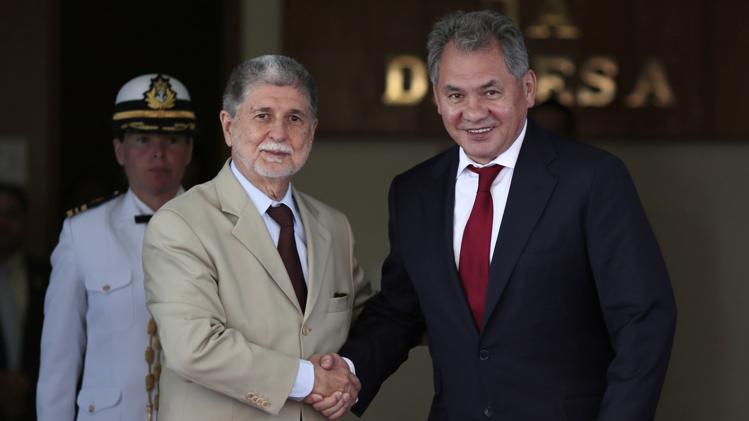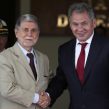
Moscow Expands Its Presence in Latin America
Publication: Eurasia Daily Monitor Volume: 11 Issue: 53
By:

Nobody should think that Moscow’s aggressive campaign to restore its former status as a global great power or its fundamentally anti-American policy is currently confined to Ukraine. Indeed, while the invasion, occupation and annexation of Crimea—not to mention the threats to eastern Ukraine—continue, Moscow is also seeking to expand its military, political and economic footprint in Latin America. Russia seeks to establish permanent bases in the Western Hemisphere to challenge the United States’ policies as well as to try to peel away US allies from Washington’s influence. Moscow is also reorienting its primary base of action in Latin America away from Venezuela, where the regime of Nicolas Maduro has proven singularly incompetent in meeting economic and political challenges, to the more stably pro-Russian Nicaragua.
In this context, little doubt remains that Moscow believes that the region of Latin America can play a growing role in world affairs and has expanding mutual interests with Russia to check US power. Indeed, Foreign Minister Sergei Lavrov told Latin American ambassadors as much when he briefed them on Russian policy in Ukraine on March 13 (Interfax, March 13). As part of Moscow’s rising interest in Latin America—which seems to increase whenever ties with Washington worsen—one can observe renewed emphasis on arms sales as a lever of influence. These are also generally accompanied by energy deals as a second route—the sequence of which deal comes first not being of any particular importance. Thus, with Brazil, Moscow is trying to generate interest in joint development of combat aircraft and surface-to-air missile systems. If successful, this would mark a step toward creating a group of industrialized countries that employ Russian designs and design bureaus for creating their own military hardware, thereby making the Russian defense sector more secure, pervasive and particularly significant in high-tech areas. Meanwhile, Moscow will sell entire weapons systems to less-developed countries endowed with cash, as it has done with Venezuela (Russian International Affairs Council, March 11).
But arms sales hardly exhaust Russia’s repertoire here. Perhaps the most significant move was revealed on February 26 by Defense Minister Sergei Shoigu when he described a global plan of potential bases for the Russian Navy. These targets for bases also include countries in Asia like the Seychelles Islands and Singapore (RIA Novosti, February 26). In Latin America, Russia is seeking bases in Cuba, Nicaragua and Venezuela, all of whom are Moscow’s allies. Yet, significantly, two of these states—Cuba and Venezuela—could face a change of leadership or even regime in the near future. These proposed naval bases represent an effort to undermine the US and its allies in Latin America (ITAR-TASS March 5; lignet.com, March 18). Indeed, the Russian military is also seeking equatorial bases for refueling its Long-Range Aircraft, suggesting combat missions for them in the vicinity of either Latin America or North America (ITAR-TASS, March 5). Nicaraguan media reports, meanwhile, pointed to the expansionist logic behind Russia’s bases and Moscow’s desire to challenge the United States in its “backyard.” These reports also noted that the Barack Obama Administration has done little or nothing to counter the expansion of Russian and Chinese influence into Latin America (La Prensa, March 3, 4).
The Russian press, on the other hand, justified these moves in terms of Moscow seeking to project its power and image abroad. “Russia has started reviving its navy and strategic aviation since the mid-2000s, seeing them as a tool to project the Russian image abroad and to protect its national interests around the globe… Now, Moscow needs to place such military assets in strategically important regions of the world to make them work effectively toward the goal of expanding Russia’s global influence,” RIA Novosti noted on February 26.
Newly released figures illustrate just how indebted Venezuela has become to aid from Russia and China. Notably, China recently advanced $5 billion in credit and Russia provided $2 billion in credit to Venezuela this year. The total amount of credits advanced to Caracas in the last seven years by Moscow and Beijing thus amounts to $61 billion (El Universal Online, March 11). Presumably, these funding arrangements bespeak of those two governments’ willingness to support the embattled Maduro regime in its struggle against domestic unrest over corruption, inflation, crime, mismanagement and so on (Correo del Orinoco Online, March 3; Agencia Venezolana de Noticias, March 5; Interfax, March 3).
Taken together, all these moves amount to more than just opening a “second front” in Latin America because Russia has long since done that. Rather, at a time when the Obama Administration proclaims the end of the Monroe Doctrine, Russia is clearly taking that declaration as license for enhanced activity across Latin America, where it seeks to undermine US influence while feathering its own nest. As Moscow openly talks about regaining its patrimony as a great power, Russia’s truly global ambitions are becoming patently visible now. And its active policies across Latin America and around the world provide observers with rather clear evidence of what Russia intends to do with that reclaimed status.




